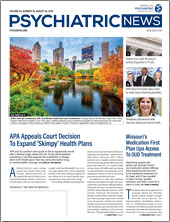Genome Analysis Uncovers Non-Psychiatric Drivers of Anorexia Risk
The genetic profiles of patients with anorexia nervosa show strong correlations to people with other psychiatric disorders, but also contain many genetic variants associated with heightened metabolism and physical activity. These findings, arising from a genomewide analysis conducted by the international Psychiatric Genomics Consortium, suggest anorexia may be a metabo-psychiatric disorder.
The international team analyzed DNA from 16,992 people with anorexia and 55,525 controls without the disorder; all participants were of European ancestry. The genetic profile of patients with anorexia showed similarities to the profile of people with obsessive-compulsive disorder, suggesting a similar biology; anorexia also shared genetic characteristics with depression, anxiety, and schizophrenia.
Patients with anorexia also had fewer genetic variants associated with metabolic problems like obesity, high cholesterol, and diabetes. This suggests that the metabolic features seen in patients with anorexia—the low fasting blood sugar, high metabolism, low body mass index—are not entirely due to self-imposed starvation. This altered metabolism also would help explain why many patients return to dangerously low weights even after hospital refeeding, noted study co-author Cynthia Bulik, Ph.D., of the University of North Carolina, in a press release.
In addition to the global genome analysis, the investigators uncovered eight individual genetic variants strongly associated with anorexia risk that merit further investigation.
“Our results encourage consideration of both metabolic and psychiatric drivers of anorexia nervosa when exploring new avenues for treating this frequently lethal illness,” the authors concluded. The study was published in Nature Genetics.
Primary Care–Based Intervention May Decrease Childhood Anxiety
A behavioral intervention designed for use in pediatric primary care improved depression and anxiety for several months after treatment ended, according to a study in the Journal of the American Academy of Child & Adolescent Psychiatry.
Previous research had shown that children who participated in this problem solving–based intervention, called brief behavioral therapy (BBT), had greater reductions in both depression and anxiety symptoms after 16 weeks compared with those who were referred to community mental health programs with expertise in pediatric depression and anxiety. That study showed particularly strong results in Hispanic children.
For this follow-up analysis, the children were followed for an additional 16 weeks. The researchers found that even though the BBT sessions had finished, the children in the BBT group still showed superior outcomes compared with the referral group in regard to overall response (combined depression/anxiety symptoms), overall functioning, and anxiety symptoms. Depression symptoms also remained “substantially reduced” in the BBT group, though the improvements were not statistically superior to the referral group at follow-up.
As with the initial 16-week data, BBT had a greater effect among Hispanic children. “[W]hether this was attributable to the nature of BBT or the fact that it was delivered in primary care, we cannot determine from this study,” the authors wrote. “Nevertheless, given the concerning level of mental health disparities in access for Hispanic youth, our findings about the acceptability and effectiveness of BBT for Hispanic youth and families delivered in primary care are promising.
Children’s Insurance Status Affects ED Response
Children without insurance who arrive at an emergency department (ED) for a mental health problem are more likely than those with private insurance to be transferred to another hospital. The findings, published in Pediatric Emergency Care by a team from the University of California, Davis, highlight a critical disparity in child mental health care.
The researchers used a national ED database to assess 19,081 acute mental health events involving children in 2014; of these events, 25.6% (4,890) resulted in a transfer to another hospital. Children without insurance were more than three times as likely to be transferred compared with children with private insurance. There was no increased rate of transfer for children using Medicaid compared with those using private insurance.
An analysis by individual diagnoses found that children with no insurance were significantly more likely to be transferred when being treated for major depression (2.6 times greater odds), schizophrenia (3.4 times greater odds), bipolar disorder (4.8 times greater odds), or attention-deficit/conduct disorders (6.2 times greater odds).
Insurance status made no significant difference in the transfer rates of children with anxiety disorders, adjustment disorders, substance or alcohol use disorders, or personality disorders.
“Emergency departments could … consider increasing the utilization of telepsychiatry services where no pediatric psychiatry expertise is available in order to increase the capacity of treating children locally and avoiding unnecessary transfers,” the authors suggested.
HIV ‘Hiding’ in CSF Linked to Risk of Cognitive Decline
Residual HIV present in the cerebrospinal fluid (CSF) may be the cause of HIV-related cognitive problems, even among patients whose virus is otherwise well controlled.
U.S. researchers from the AIDS Clinical Trials Group HIV Reservoirs Cohort Study took CSF samples from 69 HIV-infected adults who were on long-term antiviral therapy and had both low levels of HIV in the blood and good white blood cell counts. Sixty-five participants also underwent a series of neurocognitive tasks that assessed learning, memory, and motor skills.
The researchers identified HIV-associated DNA in the CSF of 48% of the participants, though only a handful of these patients had actively replicating viruses. Compared with individuals with no HIV DNA in their CSF, participants with detectable HIV DNA had lower average scores on their neurocognitive tests. Fine motor skills, executive functioning, and attention were particularly affected.
Nine (30%) of the 30 participants with detectable HIV DNA in their CSF had scores indicative of clinically impaired cognition, compared with four (11%) of 35 participants with no detectable DNA.
“This difference in the rate of impairment between the groups implies an increased risk of [HIV-associated neurocognitive disorder] among those with detectable … DNA and calls for further investigation into the clinical consequence of persistent HIV in the [central nervous system],” the authors wrote.
This study was published in the Journal of Clinical Investigation. ■




